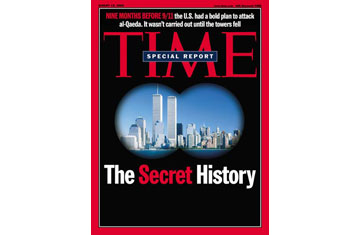
(15 of 19)
Throughout the winter and spring of 2001, European law-enforcement agencies scored a series of dramatic hits against al-Qaeda and associated radical Islamic cells, with some help from the CIA. The day after Christmas 2000, German authorities in Frankfurt arrested four Algerians on suspicion of plotting to bomb targets in Strasbourg. Two months later, the British arrested six Algerians on terrorism charges. In April, Italian police busted a cell whose members were suspected of plotting to bomb the American embassy in Rome. Two months later, the Spanish arrested Mohammed Bensakhria, an Algerian who had been in Afghanistan and had links to top al-Qaeda officials, including bin Laden. Bensakhria, the French alleged, had directed the Frankfurt cell involved in the Strasbourg plot. And in the most stunning coup of all, on July 28, Djamel Beghal, a Frenchman of Algerian descent who had been on France's terrorist watch list since 1997, was arrested in Dubai on his way back from Afghanistan. After being persuaded of terrorism's evil by Islamic scholars, Beghal told of a plot to attack the American embassy in Paris and gave investigators new details on al-Qaeda's top leadership, including the international-operations role of Abu Zubaydah. (Now back in France, he has tried to recant his confession.) French sources tell TIME they believe U.S. authorities knew about Beghal's testimony.
This action by cops in Europe was meat and drink to O'Neill. The problem was that it convinced some U.S. antiterrorism officials that if there was going to be an attack on American interests that summer, it would take place outside the U.S. In early June, for example, the FBI was so concerned about threats to investigators left in Yemen that it moved the agents from Aden to the American embassy in Sana'a. Then came a second, very specific warning about the team's safety, and Washington decided to pull out of Yemen entirely. "John [O'Neill] would say, 'There's a lot of traffic,'" recalls Mawn. "Everybody was saying, 'The drumbeats are going; something's going to happen.' I said, 'Where and what?' And they'd say, 'We don't know, but it seems to be overseas, probably.'"
Some didn't lose sight of the threat at home. On Aug. 6, while on vacation in Crawford, Texas, Bush was given a PDB, this one on the possibility of al-Qaeda attacks in the U.S. And not one but two FBI field offices had inklings of al-Qaeda activity in the U.S. that, had they been aggressively pursued, might have fleshed out the intelligence chatter about an upcoming attack. But the systemic weaknesses in the FBI's bureaucracy prevented anything from being done.
